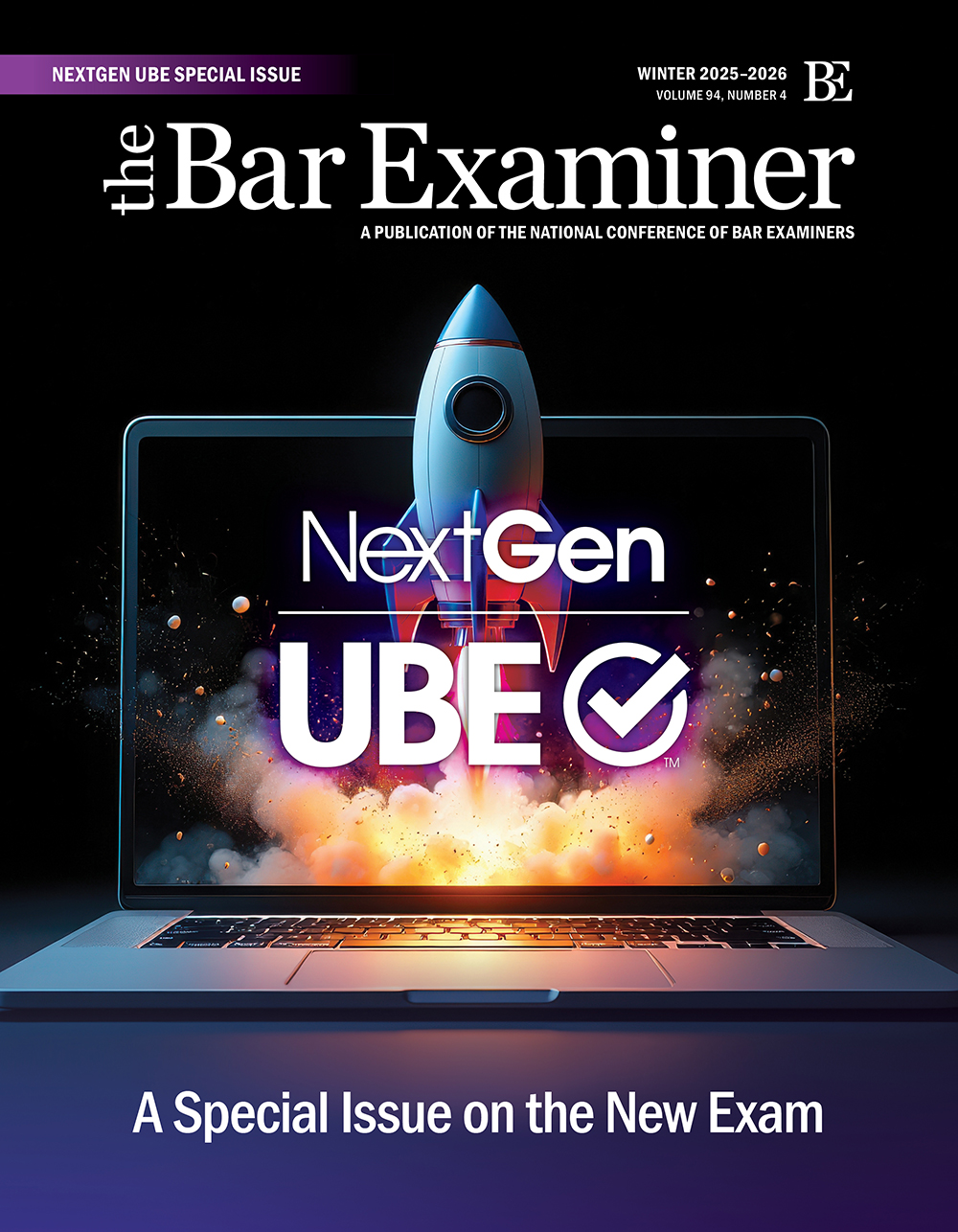This article originally appeared in The Bar Examiner print edition, March 2015 (Vol. 84, No. 1), pp 2–3.
By Bryan R. Williams
 The mission of the National Conference of Bar Examiners is twofold. It is to work with other institutions to develop, maintain, and apply reasonable and uniform standards of education and character for eligibility for admission to the practice of law. It is also to assist bar admission authorities by, among other things, providing high-quality examinations for the testing of applicants for admission to the practice of law, conducting educational programs for bar admission authority members and staff, and providing other services such as character and fitness investigations and research.
The mission of the National Conference of Bar Examiners is twofold. It is to work with other institutions to develop, maintain, and apply reasonable and uniform standards of education and character for eligibility for admission to the practice of law. It is also to assist bar admission authorities by, among other things, providing high-quality examinations for the testing of applicants for admission to the practice of law, conducting educational programs for bar admission authority members and staff, and providing other services such as character and fitness investigations and research.
In fulfilling its mission, NCBE sponsors a number of training and educational activities for the bar admissions community, provides assistance to jurisdictions on many fronts, and offers opportunities for involvement in its activities. I encourage bar examiners, administrators, judges, educators, and anyone affiliated with bar admissions to become familiar with the wide range of activities that NCBE provides and to actively participate in those activities.
For those involved in the drafting and grading of bar exam questions, NCBE sponsors a biennial mini-conference for bar examiners that addresses best practices in testing. Last fall, this two-day mini-conference, “Best Practices in Testing: A Mini-Conference for Bar Examiners,” held at NCBE’s headquarters in Madison, Wisconsin, focused on how bar examiners, especially new bar examiners, could better learn how to grade essays and how to stay calibrated in their grading over a period of time. For those who read and grade essays, this type of training is invaluable. The mini-conference also addressed the fundamental principles applicable to drafting high-quality questions, as well as desirable scoring methods to achieve the reliability required in high-stakes testing. Such best practices are also frequent topics at other NCBE educational events.
For those bar examiners from jurisdictions that use the Multistate Essay Examination (MEE) and/or the Multistate Performance Test (MPT), NCBE conducts grading workshops after the administration of each exam. These workshops, led by workshop facilitators familiar with the questions and grading materials and by NCBE testing staff, provide excellent analysis of the questions and expose attendees to the best practices for grading the questions to achieve the goal of spreading the scores. The workshops can be attended in person or via conference call; the sessions are also videotaped and edited and made available on demand for graders to stream at their convenience beginning the week after the exam.
In addition to providing training, NCBE devotes considerable resources to providing educational opportunities for the bar examining community and state courts, such as its Annual Bar Admissions Conference. It is always important to know the trends in bar admissions and the latest hot-button issues experienced by bar examiners throughout the country. This year’s Conference, held in Chicago from April 30 to May 3, will focus on, among other topics, a profile of the legal profession with particular emphasis on law school enrollment, law school debt, bar admission trends, and employment. Also sure to be of great interest are several sessions addressing specific character and fitness and ADA issues, as well as sessions discussing the admission of foreign-trained lawyers and exploring the future of tablet technology in testing. Other educational events sponsored by NCBE include biennial academic support conferences directed to law school faculty and administrators to help law schools maximize their students’ preparation for the bar exam, and mini-seminars educating select small audiences on a variety of topics.
Much of NCBE’s important work is done through its committees. One of my goals this year was to broaden the scope of committee membership by inviting a wider array of people involved in bar admissions from various jurisdictions. Standing committees on which people can serve include the following: Character and Fitness, Diversity Issues, Editorial Advisory, Education, Long Range Planning, Multistate Bar Examination, Multistate Essay Examination/Multistate Performance Test, Multistate Professional Responsibility Examination, Technology, and the Special Committee on the Uniform Bar Examination. Serving on a committee affords members the opportunity to learn about and participate in any of several aspects of bar admissions—whether exchanging ideas about the content of the questions that appear on NCBE exams and the methods for grading the questions, exploring technological advances in testing and grading, looking at issues that affect the diversity of the testing population, identifying and planning educational opportunities for the bar examining community, addressing issues relating to character and fitness, or participating in decisions concerning the content of this very magazine.
NCBE also assists jurisdictions with the more technical aspects of testing and grading—an invaluable service provided by NCBE’s staff of experienced testing professionals. Bar examiners in all jurisdictions face issues that go far beyond simply writing and grading the bar exam. Standard setting, reliability and validity of jurisdiction-drafted tests, and new and different testing methods are just a few of the issues faced by bar examiners for which NCBE provides guidance and expertise. For example, a number of years ago, the New York State Board of Law Examiners, on which I serve as a bar examiner, considered a controversial policy issue that had been visited by other jurisdictions. New York is the largest jurisdiction in terms of the numbers of candidates tested (over 15,000 in 2014), and much of the content of its exam is actually drafted by the Board. For these reasons, the issues central to the administration of the New York Bar Exam, and the policy concerns in New York, tend to be somewhat different from those in jurisdictions that test fewer applicants and that may rely on NCBE to draft their test questions. NCBE’s assistance in performing demographic studies, as well as lending its expertise in analyzing the data received, was invaluable to the New York Board in considering the controversial policy issue.
A number of state boards, in addition to their policy functions, are responsible for evaluating the character and fitness of applicants to the bar. NCBE offers investigation services to state bar admission authorities to verify information presented by applicants on their applications for admission to the bar—not only for U.S.-educated applicants, but also for foreign-educated applicants. Given the complexity of the verification process, this service saves jurisdictions time and resources.
I encourage members of the bar admissions community to become knowledgeable about and involved in NCBE activities. One of the best ways to do this is to attend NCBE’s Annual Bar Admissions Conference and to consider serving on one of the NCBE committees. I believe that committee work is one of the best ways to get to know the organization and that contributing time and talent to a committee, with the knowledge that it furthers NCBE’s mission and ultimately benefits the profession, can be very rewarding.
Best regards to all.
Sincerely,

Bryan R. Williams
Contact us to request a pdf file of the original article as it appeared in the print edition.







